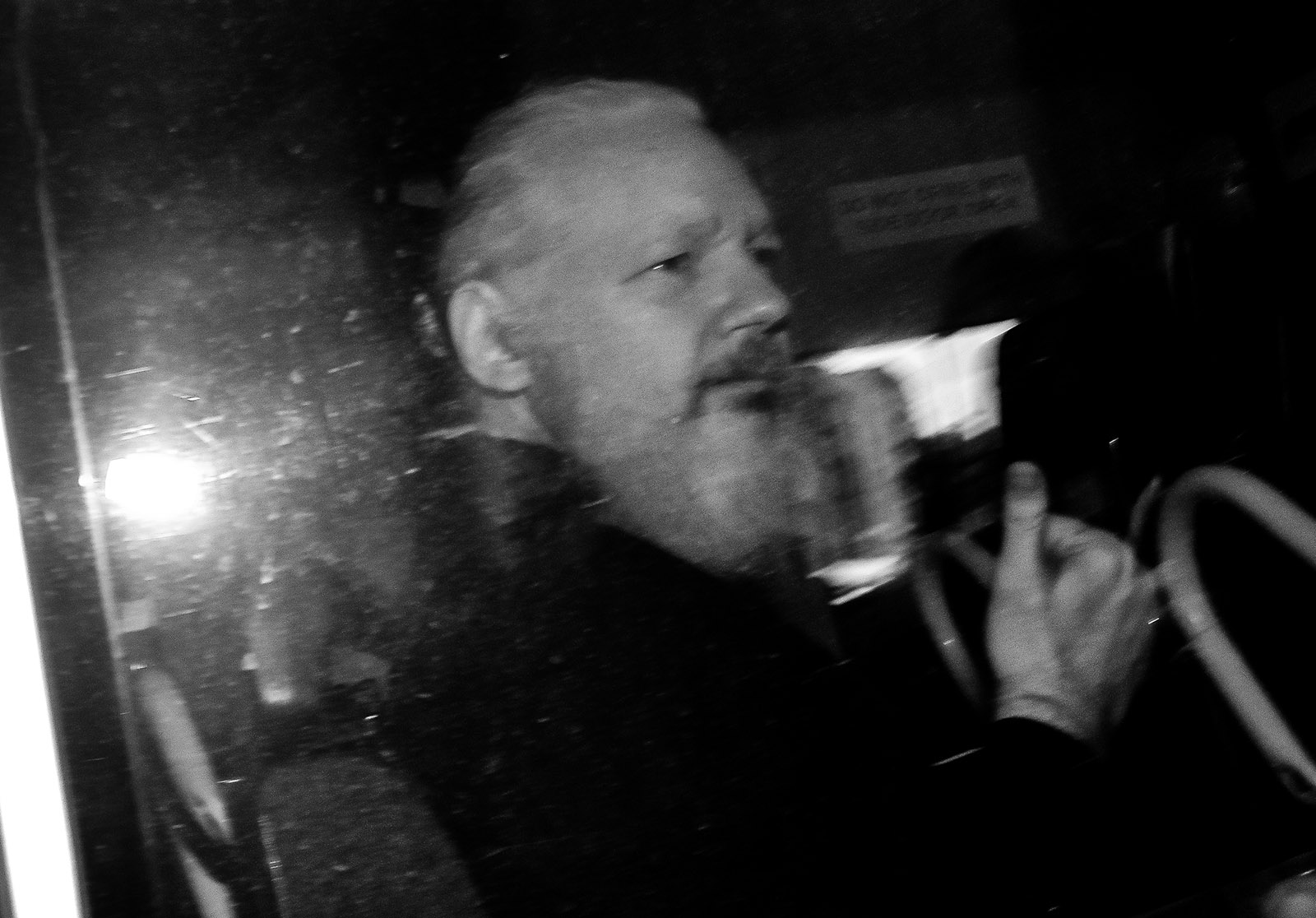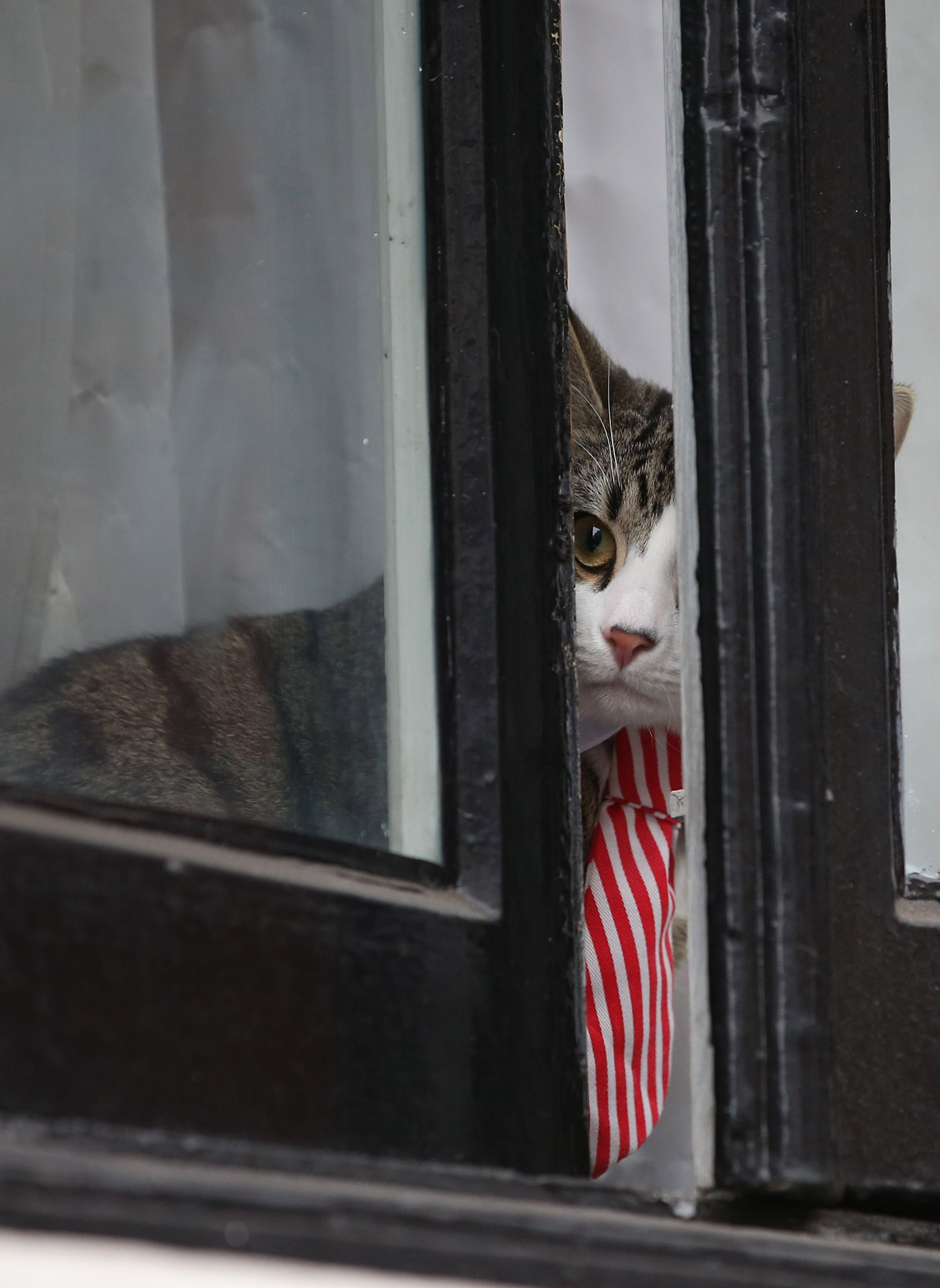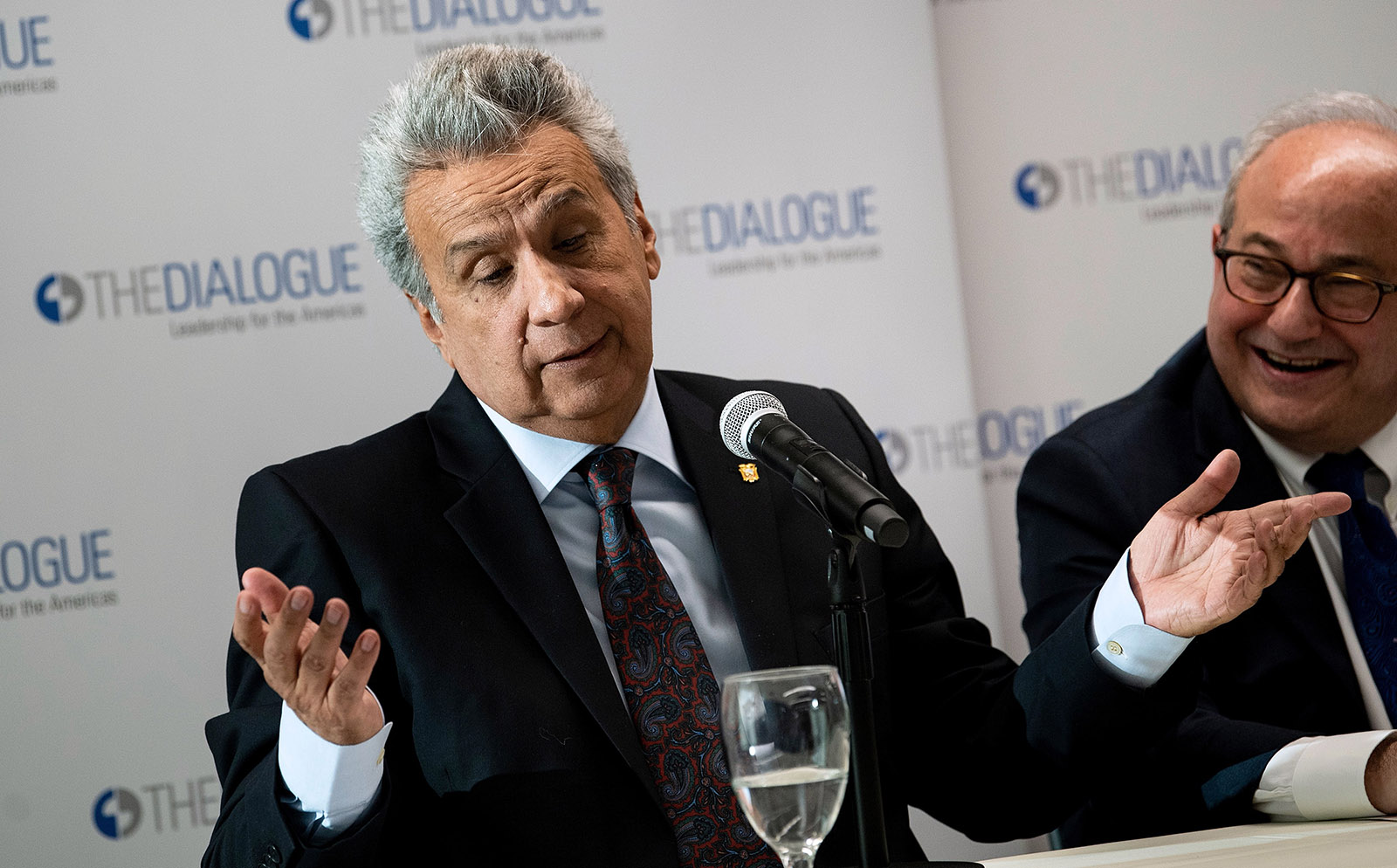Seven years ago, Julian Assange seemed at the height of his powers—a superstar information warrior behind the biggest leak in history—when he faced his first major legal blow. He had lost a long fight against extradition to Sweden, where two women had accused him of rape. The possibilities for the rootless WikiLeaks founder, who was used to working from other people’s sofas and hotel rooms around the world, narrowed rapidly.
Fearing that the Swedish investigation could lead to his extradition to the United States, in June 2012 Assange walked into the London embassy of Ecuador and claimed sanctuary. The country’s larger-than-life president who had an ego to match, Rafael Correa, was only too happy to oblige. Nearly seven years later, though, Ecuador has come out of this sticky liaison looking at lot healthier than Assange has.
The image last month of the bearded, disheveled, forty-seven-year-old man whom British police officers dragged from the door of the Edwardian mansion block in Knightsbridge, London, was a long way from the tall, fresh-faced, platinum-blond Australian who was pictured shaking hands with Ecuador’s smiling former foreign minister, Ricardo Patiño. In granting Assange asylum in August 2012, Patiño had praised the WikiLeaks’ founder’s “dedicated defense of freedom of expression.”
Ecuador’s expulsion of the WikiLeaks founder on April 11 may reflect shifting global public opinion about freedom-of-information fundamentalists like Assange, whose leaks, latterly, have been selective, to say the least. It was also a sign of the changing political climate domestically where Correa, the leader who protected Assange even as the president trampled on freedom of speech at home during his decade-long rule, is gone.
Correa’s former protégé-turned-bitter enemy, Lenín Moreno, became Ecuador’s president in 2017. Since taking office, Moreno has made no secret of his contempt for the “hacker” Assange and of his desire to get him out of the embassy, calling the WikiLeaks leader an “inherited problem” and “a stone in his shoe.”
For his part, Correa accused Moreno of capitulation to the Trump administration, telling BBC Mundo, the broadcaster’s Spanish-language service for Latin America, that Assange has been “taken out of the embassy to be extradited to the United States.” But he reserved a Trumpian vitriol for his successor—calling him “the greatest traitor in Ecuadorian and Latin American history” in a tweet on the day of Assange’s expulsion.
After numerous breaches of trust and solidarity between Assange and his Ecuadorian hosts, and multiple warnings that his asylum status was dangling by a thread, the final straw appears to have been WikiLeaks’ circulation of personal photos of Moreno and his family. In one image, the president was seen reclining on a plush bed while eating lobster. Just ten days before ending the London house guest’s sojourn, Moreno fulminated on national radio about the “photos of my bedroom, what I eat and how my wife and daughters and friends dance” that had been disseminated on social media.
Moreno stopped short of directly accusing WikiLeaks of spreading hacked photos of his family and wiretapping his phone calls and private conversations. The Ecuadorean government, however, did not hold back, referring to WikiLeaks in a formal complaint to the special rapporteur for the right to privacy, Joseph Cannataci, at the United Nations’ human rights council on April 1. The complaint accused the organization of using social media to spread private photos and personal information hacked from the president’s personal electronic devices.
The photos date back several years to when Moreno and his family lived in Geneva, where he had been posted as the UN special envoy on disability after serving as vice president to Correa during the first two of his three terms. The release of these images aimed to show that Moreno had lived a lavish lifestyle, funded, allegedly, with the corrupt proceeds of an offshore account created by his brother in Panama. The corruption scandal, known in Ecuador as the INA Papers, was peddled by Moreno’s political opponents—with help from WikiLeaks, which on April 2 tweeted that Moreno had threatened to decide soon on Assange’s fate after the organization had reported on an “offshore corruption scandal wracking his government.”
Although the tweet proved accurate in its prediction, it also appeared to indicate that Assange’s group was in cahoots with Moreno’s enemies. At a time when Ecuador has been roiled by political infighting and multiple accusations and counter-accusations of graft, WikiLeaks’ intervention seemed to be using the material in a self-serving and partisan way.
Ecuador’s foreign minister, José Valencia, denied that the circulation of the president’s family photos had anything to do with the decision to revoke Assange’s political asylum. Speaking to the NYR Daily in late April, Valencia was at pains to stress that the country’s decision to eject Assange from its embassy and strip him of the Ecuadorian citizenship he had been granted in 2017 was made principally due to Assange’s intervention in the “internal matters of other states.”
Advertisement
“His declarations on Spain’s internal politics with relation to Catalonia was when his Internet use was restricted in March of last year,” Valencia told me. The government cut Assange’s web connection and stopped him from receiving visitors on March 28, 2018. In October, it applied tighter house rules and ordered Assange either to feed his cat or give it away.
The difficulty WikiLeaks created for Ecuador in its relations with Spain appeared to cause the Moreno administration somewhat greater diplomatic discomfort than WikiLeaks’ publication of stolen emails relating to Hillary Clinton and the US Democratic Party, material that had been hacked by Russia’s military intelligence agency, the GRU. This was a central incident for the investigation of Special Counsel Robert Mueller, as recounted in Volume I of his report.
Addressing Ecuador’s parliament in Quito in April, Valencia set out a nine-point list of grievances against the WikiLeaks founder, ranging from his sanitary habits to his use of a “squelch box,” which emitted white noise to prevent eavesdropping on his conversations. Valencia also charged Assange with “constant breaches” of the embassy communications system, which, Valencia alleged, allowed Assange to intercept the official and personal communications of embassy staff, as well as footage from security cameras installed in the building.
Such hacking represented an “incredible breach of security protocols,” Valencia told me, one that would be unacceptable for any embassy in the world. On the day of Assange’s expulsion, Valencia confirmed to parliament the leaked reports of the guest’s “discourteous and aggressive” behavior toward staff, including one incident in 2014 in which Assange came to blows with an embassy security guard. The foreign minister also detailed the asylee’s skateboarding antics and soccer games in the corridors, plus one “very unpleasant” bathroom-related incident that, he stated, was “attributed to a digestive problem.” Colorful and headline-grabbing though these reports were, Valencia said they were ultimately a sideshow.
“In a story full of upheavals I think there’s been too much emphasis on his poor behavior in the embassy, the nuisance [he caused] and his lack of respect, but that’s not the whole story,” he told me. “These other elements are more important, they carry more weight,” he added, alluding to the cumulative political and diplomatic repercussions of Assange’s conduct during his long stay at the embassy.
*
If, by 2019, Assange had thoroughly worn out his welcome with the Ecuadorian government, his asylum had never been very popular with the country’s citizens. According to an opinion poll taken a week after police officers forcibly removed him, nearly three quarters (72 percent) of Ecuadoreans supported their government’s decision to revoke his status. Earlier surveys by the same polling agency, Cedatos, showed that up to 84 percent of citizens were opposed to the way Assange had been granted Ecuadorean nationality in 2017.
In September 2018, a member of parliament named Paola Vintimilla uncovered irregularities in that process when she succeeded in getting a tranche of foreign ministry documents declassified. These papers revealed that Valencia’s predecessor as foreign minister, María Fernanda Espinosa, had arranged for Assange’s citizenship to be fast-tracked. Astonishingly, in hindsight, this effort was designed to facilitate the creation of a diplomatic role for Assange in Ecuador’s Russian embassy in Moscow, starting in 2018 (the final stages of the plan took place throughout December 2017). That plan failed when the UK refused to accredit Assange’s diplomatic status.
The revelations helped to swing public opinion decisively against the WikiLeaks fugitive, said Símon Pachano, a political scientist with the Latin American Faculty of Social Sciences in Quito. In turn, the subsequent suspension of Assange’s citizenship was greeted with a “certain relief by Ecuadoreans,” he told me. “He seemed to be an instrument of murky forces, mixed up with Donald Trump, then with Russia and Vladimir Putin, which made him a very controversial figure.”
“Finally, he was seen as a part of ‘Correísmo,’” he added, “and, as such, he played a role in national politics and that was something that annoyed the public, not to mention the government.”
By Correísmo, Pachano was alluding to the way Assange’s former champion had used Ecuador’s protection of the WikiLeaks founder as a way to boost the country’s standing as a bastion of anti-imperialism. After a long spell in which the left had seemed ascendant across Latin America—with, at times, various radical, populist, or socialist governments running Brazil, Argentina, Venezuela, Honduras, and others—Correa hoped to gain continental stature by frustrating US interests.
Advertisement
This marriage of convenience did not, in the end, work out well for Assange. His association with Correísmo became a curse; once Correa was out of office, Assange’s star began to fall. Amid a political hornet’s nest over allegations of graft during Correa’s decade in power, Assange’s life inside the London embassy came under new and critical scrutiny last year. Among the scandals that emerged, as a Guardian investigation revealed last year, was that President Correa had authorized a secret program called “Operation Hotel” to spy on the man known as el huésped, or the guest, even as Ecuador gave him protection and propped up WikiLeaks.
By 2015 Assange had taken over three rooms in the embassy, which were out of view of security cameras and were accessible only by codes in his possession. One larger room was used as an office by WikiLeaks staff, though it had also become the founder’s bedroom; Assange took over half the kitchen as well. Those conditions were dramatically cut back in March 2018, and by the end of last year, a new ambassador, Jaime Marchán, had been appointed, insiders said, with the express order of expediting the guest’s exit.
Back in Ecuador, Assange’s already controversial tenancy only became more unpopular after it became apparent that, with Assange occupying about a third of the embassy, the country’s National Intelligence Secretariat, known as SENAIN, had hired an international security company and rented a flat nearby to house its spies. These measures resulted in running up a bill of some $5 million between 2012 and 2018—a figure later confirmed by Valencia after Assange’s expulsion. The foreign minister also revealed details of roughly $400,000 in Ecuadorian taxpayer funds spent on Assange’s food, medical costs, and laundry.
Correa’s posture as a champion of whistleblowing and freedom of information also took a dent in 2018 when leaked invoices showed that, even as it protected Assange, his government had spent as much as $28 million on surveillance equipment that is available only to state actors. What exactly this hardware was used for remains unclear, but many Ecuadorean journalists suspect that under the autocratic Correa this new technological capacity was used to spy on and intimidate political opponents or investigative journalists, to launch cyber-attacks on websites the government wanted to disrupt, and to hack private communications and troll critics on social media. Moreno has taken a more tolerant line with the press than his authoritarian predecessor, though he has not yet scrapped the so-called communications law, which Correa introduced in 2013 to exert control over a critical and largely private media.
Once Ecuador’s most popular leader, Correa now claims to be a victim of political persecution and has emigrated to live in his wife’s country, Belgium. In December 2017, a former vice president of his, Jorge Glas, received a six-year sentence for taking bribes from Odebrecht, the Brazilian engineering firm at the center of perhaps Latin America’s biggest ever corruption scandal. Glas is just one among many of Correa’s former associates and ministers who face prosecution or have fled amid an anticorruption crackdown. In 2018, Ecuadoreans voted overwhelmingly to reject the possibility of Correa’s re-election in a referendum called by Moreno.
*
With the tide of left-populism now at a low ebb in Latin America, Bolivia’s president, Evo Morales, was the only regional leader aside from Venezuela’s embattled Nicolas Maduro to condemn Assange’s arrest last month. Morales tweeted his “solidarity with this brother who is persecuted by the US government for revealing its human rights violations, murders of civilians and diplomatic espionage.” By contrast, Moreno—who considers himself a socialist—has consolidated his break with his predecessor “by turning away from Cuba and Venezuela and towards the US,” according to Michael Baney, an Americas intelligence analyst with the consultancy WorldAware.
Last month, Moreno’s government signed a $4.2 billion loan agreement with the International Monetary Fund as Ecuador struggles with mounting national debt, a legacy of his predecessor’s overspending and the corruption that allegedly prospered during his decade in office. Assange’s expulsion may briefly boost Moreno’s flagging approval ratings, which polls show steadily slipping this past year. The president argues that he is hard-pressed to revive economic growth and excise the rot of graft that had penetrated the country’s public institutions, infrastructure projects, and state-run oil firms.
Part of that purge is political. Last month, the Ecuadorean interior minister María Paula Romo warned of a geopolitical “destabilization” plot against the government and alleged that former foreign minister Patiño was involved with a Swedish software developer, Ola Bini, a close friend of Assange’s in Quito who had visited the WikiLeaks fugitive at the London embassy a dozen times. Romo claimed that Patiño and Bini had travelled together to Peru, Spain, and Venezuela.
Patiño denied any wrongdoing or association with Bini, who was placed under arrest last month while prosecutors investigate whether to charge him with hacking. Nevertheless, Patiño—the man who originally granted Assange political asylum—fled Ecuador days after Assange was ejected from its UK embassy after a judge ordered the former foreign minister held in pre-trial detention on a charge of instigation (fomenting civil unrest).
Following Assange’s arrest in London, ministers in Ecuador have reported millions of cyber attacks on websites belonging to the country’s foreign ministry, the president’s office, and other government departments. This apparent retaliation appears to support their claims that WikiLeaks and its associates are seeking to foment political instability. The breach was complete.
“This break between the two began well before Assange was removed from the embassy,” said Baney, “and while Assange’s removal is a part of Moreno’s rejection of Correa’s policies, it is likely more related to the internal politics of Ecuador rather than US pressure on the country.”
Given the shifting geopolitics of the region, this outcome was probably inevitable. But was Assange also his own worst enemy? Pachano, the political scientist, believes so. “He went looking for trouble,” he says. “He behaved badly, he was deliberately provocative.” A different actor might have played a more political game, he believes: “He could have looked for support from Ecuador and the world.”
You have to wonder what sort of international diplomat Assange would have made.





